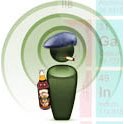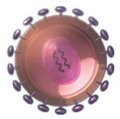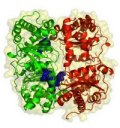 I received a job ad indirectly from the Living Fuel website today, it seemed like a fairly run of the mill science writing job asking for a ghost writer-researcher to assist in writing a weekly health newsletter etc…
I received a job ad indirectly from the Living Fuel website today, it seemed like a fairly run of the mill science writing job asking for a ghost writer-researcher to assist in writing a weekly health newsletter etc…
Usual kind of online job ad in other words.
The prospective candidates need experience in health and nutrition, obviously, and must be skilled at taking complex information and effectively communicating it to lay people. So far, so good.
One final qualification was asked for: “Working knowledge of the Bible a plus.”
Now, that’s not a run of the mill request for a science writing job. In fact, that has to be one of the most peculiar requirements for a scientific writing job I’ve ever seen. I don’t think even CS Monitor expect their science journos to have a working knowledge of the Bible. I was, however, intrigued and so took a look at the site. The first thing I noticed is that they’re basically selling some kind of health supplements. Fair enough. A testimonial from a satisfied customer provides no clues as to the Biblical intent, although the effects do seem miraculous.
Here’s the quote:
“I have had asthma since running competitively in high school and don’t like taking medications. Living fuel keeps my body alkalized and in balance so I can breathe clearly and naturally. Since using Living Fuel, I made the 4k World Cross Country Championships and finished 4th in the 2004 Olympic trials for the Steeplechase. I’m counting on Living Fuel to fuel me all the way to the 2008 Olympics!”
-Isaiah Festa, Madison, Wisconsin, USA”
Most of us don’t like taking medications, but the word medications is just that, a word. Taking any kind of supplement that has such a radical effect on the body as “alkanization” is essentially a medication whatever you call it. After all, nutraceuticals don’t sound like nutritional pharmaceuticals for nothing. The web seems to be full of product sites selling foods and supplements that claim to “alkanize the body” but I could find no mention of this “process” on any .edu or .ac.uk site and only one mention of the phrase in PubMed with regard to cell pH. Am I missing something, here?
Regardless, I’m still confused as to where the Bible reading comes into the job, I could find no mention of Christ on the site, and only a pdf file that cites Genesis in the references in the context of longevity. Needless to say, I probably won’t be applying for the job. I’m sure after reading my review of Richard Dawkins’ The God Delusion, they wouldn’t want to take me on anyway.
 A bag of moss lying in an irrigation ditch in North East Italy does not conjure up a picturesque image nor the cutting edge of analytical science but nevertheless the special characteristics of the moss Rhynchostegium riparioides make it the ideal environmental monitor according to researchers at the University of Trieste and their colleagues at ARPAV.
A bag of moss lying in an irrigation ditch in North East Italy does not conjure up a picturesque image nor the cutting edge of analytical science but nevertheless the special characteristics of the moss Rhynchostegium riparioides make it the ideal environmental monitor according to researchers at the University of Trieste and their colleagues at ARPAV. As antibiotics fall to bacterial resistance one by one, it is essential that medicinal chemists keep ahead of the game by finding compounds with new modes of attack. Recently a new antibiotic, platensimycin has been found to act potently through a novel mechanism. Now, US chemists have devised a total synthesis for this unique compound and tracked their progress using mass spectrometry and NMR spectroscopy.
As antibiotics fall to bacterial resistance one by one, it is essential that medicinal chemists keep ahead of the game by finding compounds with new modes of attack. Recently a new antibiotic, platensimycin has been found to act potently through a novel mechanism. Now, US chemists have devised a total synthesis for this unique compound and tracked their progress using mass spectrometry and NMR spectroscopy. I received a job ad indirectly from the Living Fuel website today, it seemed like a fairly run of the mill science writing job asking for a ghost writer-researcher to assist in writing a weekly health newsletter etc…
I received a job ad indirectly from the Living Fuel website today, it seemed like a fairly run of the mill science writing job asking for a ghost writer-researcher to assist in writing a weekly health newsletter etc… Aside from write-ups in the New York Times and the journal Nature, there has been very little in the media recently concerning the plight of five Bulgarian nurses and a Palestinian doctor who face death sentences in Libya. The six are charged with deliberately infecting hundreds of children with HIV, the AIDS virus, in 1998. The charges are nothing more than “preposterous” says the NYT, given that infections appeared before these medics began work at the hospital in question! The NYT suggests that this “looming miscarriage of justice demands a strong warning to the Libyan leader, Muammar el-Qaddafi, that his efforts to join the ranks of peaceable nations will suffer if the medical workers are made the scapegoats for the failure of Libya’s own health system.” The evidence points to wholly inadequate hygiene as being to blame rather than the accused individuals.
Aside from write-ups in the New York Times and the journal Nature, there has been very little in the media recently concerning the plight of five Bulgarian nurses and a Palestinian doctor who face death sentences in Libya. The six are charged with deliberately infecting hundreds of children with HIV, the AIDS virus, in 1998. The charges are nothing more than “preposterous” says the NYT, given that infections appeared before these medics began work at the hospital in question! The NYT suggests that this “looming miscarriage of justice demands a strong warning to the Libyan leader, Muammar el-Qaddafi, that his efforts to join the ranks of peaceable nations will suffer if the medical workers are made the scapegoats for the failure of Libya’s own health system.” The evidence points to wholly inadequate hygiene as being to blame rather than the accused individuals. The six medics were arrested in 1999. Confessions were wrought from each of them under torture according to human rights organisations, but the individuals later retracted their statements. It seems to be beyond doubt that the six are not guilty yet they have been under a death sentence since 2004. Nature suggests that the silence of scientists over this case is due to a hope that diplomacy might resolve the issue. After all, the NYT reports, the White House currently has Libya on a pedestal as an ideal state that no longer abides weapons of mass destruction.
The six medics were arrested in 1999. Confessions were wrought from each of them under torture according to human rights organisations, but the individuals later retracted their statements. It seems to be beyond doubt that the six are not guilty yet they have been under a death sentence since 2004. Nature suggests that the silence of scientists over this case is due to a hope that diplomacy might resolve the issue. After all, the NYT reports, the White House currently has Libya on a pedestal as an ideal state that no longer abides weapons of mass destruction. The day the UK’s medicines approval agency NICE, announces that certain Alzheimer’s drugs are to be limited to those in the latter stages of the disease to get the best value for money, I read a Nature press release announcing a novel approach to treating the disease based on supercharging an enzyme that looks like the video game character Pac-man. US researchers have determined the crystal structure of a protein-degrading enzyme as it binds to its natural protein substrates.
The day the UK’s medicines approval agency NICE, announces that certain Alzheimer’s drugs are to be limited to those in the latter stages of the disease to get the best value for money, I read a Nature press release announcing a novel approach to treating the disease based on supercharging an enzyme that looks like the video game character Pac-man. US researchers have determined the crystal structure of a protein-degrading enzyme as it binds to its natural protein substrates.